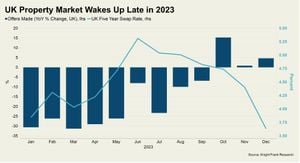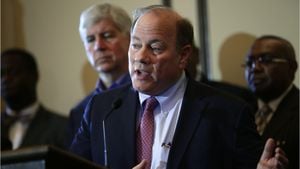Hurricane Helene has carved its mark across North Carolina, leaving towns ravaged and communities grappling with the aftermath. Amidst the tempest's destruction, the Federal Emergency Management Agency (FEMA) has come under scrutiny, particularly concerning claims of political bias—specifically, allegations stating the agency intentionally avoided aiding homes supporting former President Donald Trump during recovery efforts.
The chaos started as Hurricane Helene struck the U.S. mainland, being heralded as one of the deadliest storms since Hurricane Katrina. With the death toll rising to 102 and many others still unaccounted for, residents of Western North Carolina were left reeling. Reports surfaced, outlining how FEMA workers were allegedly instructed to bypass certain homes marked with political signage supporting Trump, contributing to the overall distress of the affected communities.
The controversy exploded when former FEMA supervisor, Marn’i Washington, revealed her side of the story. After being fired, she spoke openly with YouTube podcaster Roland Martin, stating she had been following what she described as common practice within the agency. “FEMA preaches avoidance first, and then de-escalation. This is not isolated,” Washington argued, adding her actions were hardly unprecedented. "You will find avoidance not just in Florida; this happens everywhere, including the Carolinas.” Her remarks ignited Twitter and media forums with accusations of politicized disaster responses.
An anonymous FEMA official also corroborated Washington's claims, highlighting the agency's alleged long-standing practice of skipping over homes flanked by Trump-affiliated signs or located within predominantly Republican areas. They described it as an open secret, saying the practice has been employed for years under the banner of “equity.” This insider shared, “It’s not crazy to say the agency has been instructed to exclude white communities from support.”
While some maintain these accusations depict mere bureaucratic inefficiency, others argue it touches on serious ethical and partisan divides within emergency management agencies. Congressional Republicans, representing affected states, have voiced intentions to investigate these serious claims. "We are going to launch multiple investigations to find out if they neglected their duties based on political reasons,” stated one GOP lawmaker, echoing sentiments of others within the party.
On the ground, the response to Hurricane Helene has drawn ire not just due to perceptions of inequity but for what many saw as inadequate assistance overall. Local leaders criticized FEMA's delay and perceived mishandling of the situation. JD Vance, the Republican vice presidential nominee, labeled the federal response to Hurricane Helene as “pure bureaucratic incompetence,” closely emulating sentiments shared by Trump himself. The former president asserted, “The people of North Carolina have suffered incredibly, and FEMA has been a total disaster.”
Adding to the mix of chaos was the rising tide of misinformation clouding the disaster response. Misinformation spread quickly during and after the hurricane struck, creating confusion for FEMA workers trying to navigate treacherous conditions. Reports emerged of armed groups threatening aid workers, compelling agencies like FEMA to tread carefully as they maneuvered through devastated areas.
Despite official claims of threats influencing their operation strategy, several former FEMA employees indicated the organization’s real motivations were rooted not just in safety but also skewed political representations. The agency purportedly instructed personnel to be wary of the political affiliations of communities, effectively clouding their humanitarian mission with political hues.
The aftermath of the hurricane continues to unravel, with officials reinforcing their commitment to restoring normalcy. Vice President Kamala Harris emphasized the importance of support for communities affected by Helene, asserting, “We will stand with communities impacted by Hurricane Helene for as long as it takes.” While promises are made, many, including local residents, feel frustrations simmer as they await the comprehensive assistance they desperately need.
Emerging from this debacle are numerous lessons about response strategies and community engagement. The urgency for FEMA to refine its protocols has never been clearer. This storm's aftermath reveals the politically entwined challenges facing disaster management, showcasing the need to prioritize community safety and support over partisan interpretations.
Looking to the future, as North Carolina and states alike contend with not just the physical remnants of Helene but also the underlying political rifts highlighted by this disaster, the community’s resilience is put to the test. Concerted efforts to bridge the divide and mend these fractured relationships must be on the agenda. How FEMA and other agencies respond to the recovery of Hurricane Helene will set the tone for disaster management and community trust moving forward.



